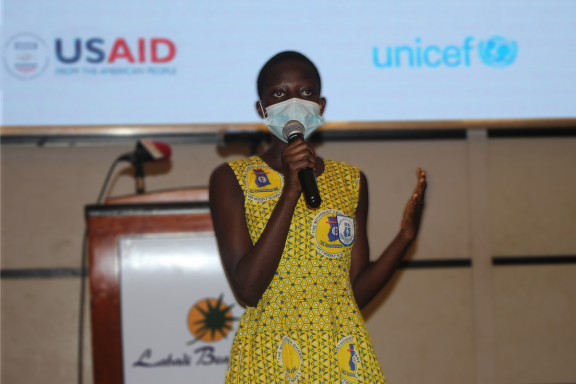
On June 22, 2021, USAID Advancing Nutrition hosted a national multi-sectoral nutrition coordination learning event in Ghana’s capital Accra. The event brought together more than a hundred key stakeholders in food and nutrition security to build consensus on how different sectors can collaborate. They included government ministries, departments, and agencies; development partners; academia; Scaling up Nutrition stakeholders; and civil society organizations.
Ghana is currently on track to achieve some of the 2025 World Health Assembly global nutrition targets, including reducing the number of children under 5 who are stunted (low height for age) by 40 percent, reducing anemia in women of reproductive age by 50 percent, and preventing an increase in childhood obesity. Other targets will be difficult to reach, such as reducing the number of children with low birthweight by 30 percent and reducing childhood wasting (low weight for height) to less than 5 percent.
Participants discussed the findings of a new nutrition landscape analysis as well as stakeholder mapping research undertaken by the United Nations Children’s Fund (UNICEF) and USAID Advancing Nutrition. These studies highlighted the need for improved coordination and increased investment in food and nutrition security by the government in order to reach all of the 2025 goals.
“Now more than ever, it is critical to renew our commitment to improve food and nutrition security to address malnutrition across the country,” said Acting Director for USAID/Ghana’s Health, Population, and Nutrition Office, Dr. Stephen Dzisi.
“Achieving universal access cannot be done by the health sector alone. It requires partnership and collaboration with other sectors such as agriculture, water and sanitation, social protection, among others, to address the determinants of nutrition,” Dr. Francis Kasolo, World Health Organization representative to Ghana, also noted.
The learning event included an orientation on food and nutrition security planning guidelines developed by Ghana’s National Development Planning Commission (NDPC) with support from USAID Advancing Nutrition. These guidelines will support district assemblies in Ghana to integrate food and nutrition security into their medium-term development plans. The event was organized by the NDPC in collaboration with UNICEF and the United States Government, through USAID Advancing Nutrition.